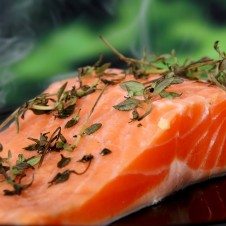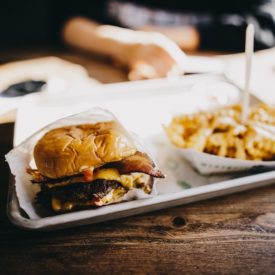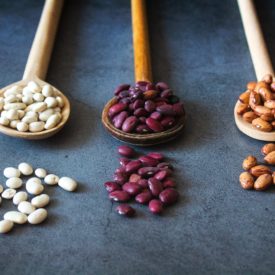I discuss the truth about good fats vs bad fats and the best and worst fats and oils for your health.
When it comes to the question of what to grease your pan with or drizzle on your salad, there is certainly a lot of confusion to be found in the dairy and oil aisles. We talk about good fats and bad fats, but the story seems to constantly change.
Is butter the devil or the new health food? Is margarine heart healthy or practically plastic? Should I start putting globs of coconut oil in my smoothies and oats and will this help me lose weight or gain it?? Phew. Life is complicated enough!
Well, the following infographic will hopefully become something you will bookmark as your one-stop-shop for everything unctuously rich. We’ll explore if there even is such a thing as good fats and bad fats and why you may think that at one time or another. Assembled in parts by two of my fantastic Ryerson Nutrition student volunteers, Olivia Cupido and Rachel Dies- we’ve compiled all of the information about fats you may be curious about into one place. All of the following fats and oils are approved by Health Canada as safe and are available to buy, but they each present their own unique set of health benefits, concerns and uses. Some are great for cooking, while others can’t stand the heat. Some raise good cholesterol, while others risk raising bad cholesterol. This quick guide will help you make the best choices for your health and for your recipe every single time. There’s also this handy article I found that discusses some of my favourite fat-packed foods.
But which are the good fats and which are the bad, and which are BEST for you? Well, I don’t believe it’s as easy as calling one oil the “best” and one the “worst”. I think all fats and oils are an important part of a healthy diet, and because they all have different nutrient profiles, it really is best to get a variety of them rather than sticking to just one. For example, if you only use olive oil, you may be missing out on those heart healthy monounsaturated fats that canola oil delivers. You also have to consider what you’re making. If we’re talking baked goods, then yes, I do love my butter, but avocado oil is fantastic drizzled on salad. So in that sense, there isn’t necessary any that are bad fats, and any that are absolutely inherently, in every situation good fats.
I think my overarching recommendation is that no matter what fat you use, try to use it as an ingredient rather than just a greasing tool. That way, you will use a high quality version and use less of it. For example, I go for gorgeous grass fed butter, extra virgin olive oil and organic cold pressed canola- oils with big bold flavours that speak for themselves and then use non-stick cookware instead of adding lots of oil to my pans.
Good Fats vs Bad Fats – Decoding Fat & Oil

Updated on September 1st, 2022

Abbey Sharp is a Registered Dietitian (RD), regulated by the Ontario College of Dietitians. She is a mom, YouTuber, Blogger, award winning cookbook author, media coach specializing in food and nutrition influencers, and a frequent contributor to national publications like Healthline and on national broadcast TV shows.




Christy says
What do you think about baking with non-hydrogenated soft margarine? I recently read a claim that baking will cause trans fats to form, but I’m not convinced that’s true.
Melissa says
Hi! This infographic is amazing and really helpful, but I was wondering what are your thoughts on ghee? Because I’ve read a lot of things about it and I’m not sure whether ghee is better than butter.
Thank you!
Abbey Sharp says
Hi Melissa. Im glad it was helpful! In terms of ghee vs butter, I think it depends on the intended use. For instance, ghee tends to be more suitable for high-temp cooking whereas the sweeter taste of butter makes it better for baking… the research also suggests that ghee may be a better choice for people with lactose and casein sensitivities. Theres no research to suggest that ghee is better than better so both can be enjoyed in moderation.